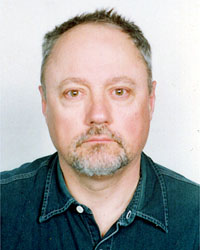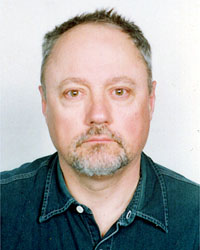
Prominent Canadian Author Larry Frolick to YT: “The Cultural History of Yemen is of International Importance!” [Archives:2001/09/Interview]
February 26 2001

Being impressed with what Yemen Times staff provide its readers, he decided, on his arrival in Sana’a airport, to visit the Yemen Times Bureau in Taiz.
With two copies of articles with photos taken from Yemen Times and written by its Taiz staff journalists, Larry was able on his arrival in Taiz to recognize Mr. Mohammed Al-Hakimi of Yemen Times who had the privilege of interviewing him. Excerpts from this interview follow.
Q: What brought you to Yemen?
A: I am doing research for my next book, The Search for Sheba’s Gold. I have had the great help of a new Canadian company, Canadian Mountain Minerals (Yemen) Ltd., which is looking for minerals in Yemen. This is a public company and Mr. Fipke is the CEO.
Q: You told the Yemen Times that Yemen is the first Middle East country you have visited. Why is that?
A: It is the most mysterious country in the Arab world for Westerners. Among other things, it is the country where the great French poet Arthor Rimbaud once lived.
Q: Have you always been a writer?
A: I studied and took university degrees in both anthropology and Law from the university of Toronto in Canada. I was editor of the college literary quarterly and I worked as a lawyer, and my family were all writers – brother, mother, uncles, and my father too.
So it was natural I would continue this tradition.
Q: What books have you published?
A: I wrote Splitting up Divorce, Culture and the Search for a Real Life, in 1998. This was a serious book about social change in industrial society; next is Ex Human The Shadow Life of Digital Culture, about our relationship to the new machines. I also edited my brother’s book, Fire Into Ice and Charles Fipke and The Great Diamond Hunt by Venon Frolick, about the billion-dollar diamond mine discovered by Mr. Fipke in Canada. This book was a number one bestseller. They will make a film about it next.
Q: How long has your research taken you so far?
A: I began my research 18 months ago, reading every thing in the University of Toronto research library, and speaking to geologists, archeologists, and historians. Always the same question: was there a queen of Sheba? Was it possible for such rich gold mines, as the Old Testament says, to exist?
Q: And what is your opinion?
A: Last week I visited the National Museum in Sana’a. There are many interesting alabaster statues of either queens or goddesses. The technical level of the Sheba script suggests that a high level of civilization existed in 1000 BC in Yemen. Both the Bible and the Holy Quran say it too.
Q: Why are you so interested in the queen of Sheba that you would write a whole book on this?
A: I was interested because so many people were interested in this subject. Not only the Arab people, but of course the Ethiopians, the Jews, and European Christians too, were fascinated by the story of a great queen of the south who journeyed with 120 tablets of gold to see the wise prophet, Solomon. What was it about this story that has fascinated the world for 3000 years?
Q: And what do you think made this such a popular story?
A: I think it is a story about what is truly valuable between man and woman. A ” deep myth” historically true, and true also on a deeper level as all myth is.
Q: Do you have any example of myths that are “true” like this, from your own country?
A: Yes. There are many. For example, we have many stories in our newspapers and contemporary folk culture about aliens; these creatures have big heads, pointy eyes, little bodies. They don’t do any thing bad to us, yet these aliens threaten us because they both exist and do not exist at the same time.
Q: So you are saying that Europeans both believe and do not believe in aliens, at the same time?
A: Yes, the alien represents the very real principle of uncertainty. We, in the West are no longer certain of our own survival as a species. The alien is like the shadow of our death-extinct-human descendants-evolution. The technology of DNA terrifies us, so we tell ourselves stories about it. This is myth.
Q: Very interesting. Why did you come to Taiz? Are you looking for aliens here too?
A: I enjoy your company! Seriously, the Yemen Times strikes me as an intellectual newspaper. I was happy to meet with you and Farouq Al-Kamali who wrote a wonderful article about queen Bilquees just when I arrived in Yemen. I was very lucky!
Q: And where will you be going next?
A: I hope to visit Ethiopia soon and see the home of queen Makida.
Q: And what comparisons have you made between Yemen and Canada?
A: The geology of Yemen is exactly like Nevada in the US. In Canada we have a lot of rocky mountains with fertile valleys, not most people want to live in cities.
Here I think many people want to live in the country. Because of the cold weather, people in the Canadian countryside are more socially isolated from each other. In the cities we huddle together for comfort and eat donuts or other pastries baked by a company that was started by a hockey player. See, more myth!
Q: And what do you think is the future for literature and culture in Yemen?
A: I think it is wonderful, for three reasons: One, your ancient history is your valuable birthright. Two, your neighbors, India, The Gulf and Egypt, give you interesting perspectives. Three, the obvious democratic impulses of the Yemeni people and their love of classics is a powerful force when combined. In art I believe formal training is everything, and this you have in Yemen.
Q: Thank you for this interview. Any last words?
A: I want to thank the people of Yemen and the Yemen Times for their kindness and generosity. God be with you!
——
[archive-e:09-v:2001-y:2001-d:2001-02-26-p:./2001/iss09/intrview.htm]


